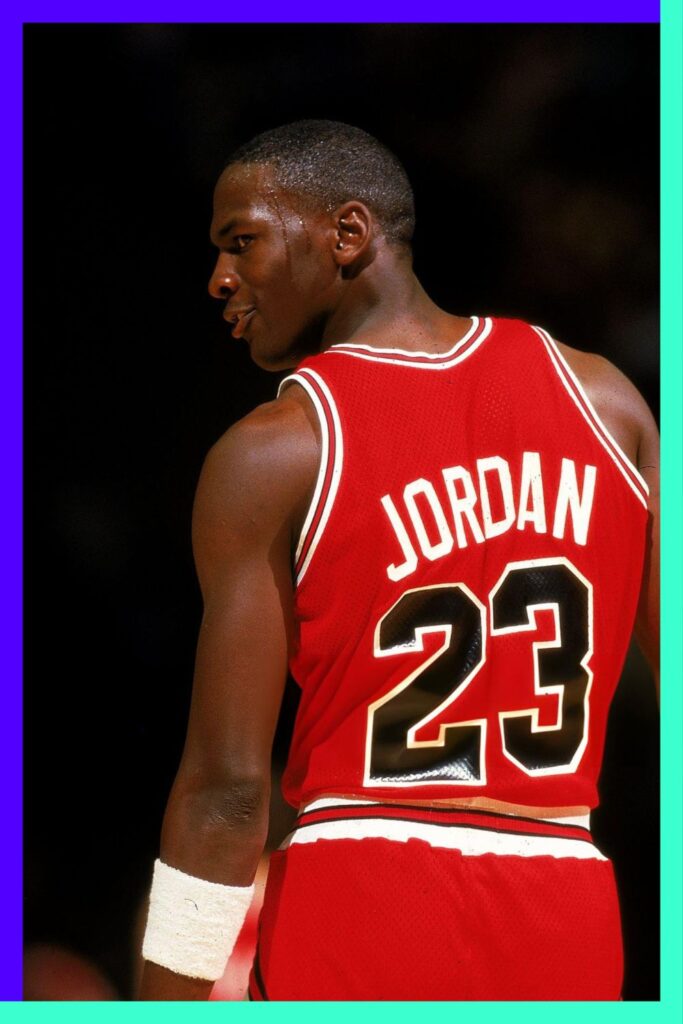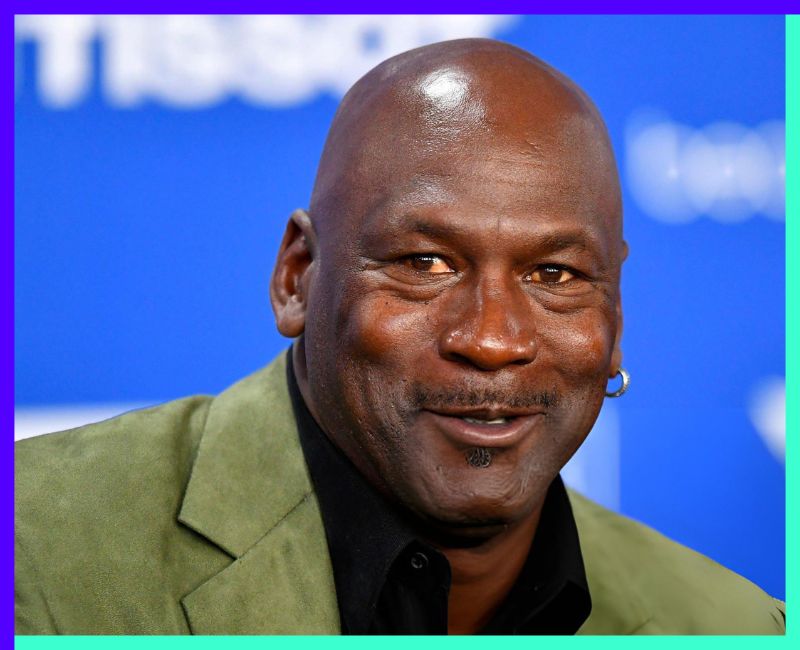Michael Jordan is a name synonymous with excellence, dominance, and unparalleled achievement in the world of sports. Widely regarded as one of the greatest basketball players of all time, Jordan’s influence transcends the court, extending into business, pop culture, and philanthropy. This comprehensive biography explores his journey from a competitive kid in North Carolina to a global icon.
Michael Jordan: A Biography
Early Life and Family
Michael Jeffrey Jordan was born on February 17, 1963, in Brooklyn, New York. His mother, Deloris, worked as a bank teller, and his father, James, was a General Electric maintenance worker. Seeking a safer environment for their children, the family relocated to Wilmington, North Carolina, where Michael’s competitive spirit began to flourish. Inspired by his father’s work ethic and determination, young Michael often engaged in backyard basketball games with his brother Larry, which ignited his passion for the sport.
At Emsley A. Laney High School in Wilmington, Jordan initially didn’t make the varsity basketball team, a setback that only fueled his determination. By his senior year, he had grown in both stature and skill, becoming one of the most sought-after high school recruits in the nation. His performance at a summer basketball camp caught the attention of Dean Smith, the legendary coach of the University of North Carolina (UNC), who offered him a scholarship.
College Career
Jordan enrolled at UNC in 1981, where he quickly made his mark. As a freshman, he scored the game-winning basket in the 1982 NCAA Championship game against Georgetown, a moment that foreshadowed his future as a clutch performer. His prowess on the court earned him the title of NCAA College Player of the Year in both 1983 and 1984. After his junior year, Jordan declared for the NBA Draft, leaving UNC with a degree in geography, which he completed in 1986.
Professional Basketball Career
The Chicago Bulls selected Jordan with the third overall pick in the 1984 NBA Draft. His rookie season was nothing short of spectacular, as he averaged 28.2 points per game and received the NBA Rookie of the Year Award. Despite a foot injury that sidelined him for much of his second season, Jordan bounced back to lead the league in scoring for the first of many times. In the 1986-87 season, he became the first player since Wilt Chamberlain to score more than 3,000 points in a single season.
Under Jordan’s leadership, the Bulls transformed into a powerhouse. The team won their first NBA Championship in 1991, defeating Magic Johnson’s Los Angeles Lakers. This victory marked the beginning of an era, with the Bulls securing three consecutive championships from 1991 to 1993. Jordan’s athleticism, scoring ability, and fierce competitiveness were crucial to these successes, establishing him as the premier player in the NBA.
First Retirement and Baseball Career
In October 1993, following the tragic murder of his father, Jordan announced his retirement from basketball, seeking to fulfill his father’s dream of him becoming a professional baseball player. He signed a minor league contract with the Chicago White Sox and played for the Birmingham Barons. While his baseball stats were modest, with a .202 batting average, Jordan’s dedication and work ethic were evident. However, his passion for basketball remained undiminished.
Return to the NBA and Second Three-Peat
In March 1995, Jordan made a dramatic return to the NBA with a simple declaration: “I’m back.” His return rejuvenated the Bulls, who went on to achieve another three-peat, winning championships in 1996, 1997, and 1998. The 1995-96 Bulls set an NBA record with 72 regular-season wins, a record that stood until 2016. Jordan’s performance during these years earned him his fourth and fifth MVP awards, solidifying his status as the best player in the league.
Second Retirement and the Washington Wizards
Jordan retired for the second time in January 1999 but returned to the NBA in 2001, this time with the Washington Wizards, where he also served as part owner and president of basketball operations. Although he was not the same dominant force, he still displayed moments of brilliance and leadership on the court. Jordan played two seasons with the Wizards before retiring for good in April 2003, at the age of 40.
Michael Jordan’s Jersey Numbers

Throughout his career, Jordan is most famously associated with the number 23, which he wore for the majority of his time with the Bulls. Upon returning to the NBA in 1995, he initially wore the number 45 in honor of his late father but switched back to 23 during the 1995 playoffs. Notably, he wore number 12 for one game in 1990 after his jersey was stolen, scoring 49 points against the Orlando Magic.
Olympic Success
Jordan first represented the United States at the 1984 Olympic Games in Los Angeles, where he led the team to a gold medal. He returned to the Olympics in 1992 as a member of the “Dream Team,” which included NBA legends such as Larry Bird and Magic Johnson. The Dream Team dominated the Barcelona Games, easily winning the gold medal and cementing their place in history as one of the greatest teams ever assembled.
Awards and Honors
Jordan’s career is decorated with numerous accolades. He received the NBA MVP Award five times (1988, 1991, 1992, 1996, 1998) and was a 14-time NBA All-Star. He won 10 scoring titles, was named to the All-Defensive First Team nine times, and earned six NBA Finals MVP awards. Jordan was inducted into the Naismith Memorial Basketball Hall of Fame in 2009, and in 2016, he was awarded the Presidential Medal of Freedom by President Barack Obama, acknowledging his impact beyond basketball.
Business Ventures and Endorsements
Jordan’s influence extends beyond the basketball court into the business world. His partnership with Nike, beginning in 1984, led to the creation of the Air Jordan brand. The Air Jordan sneakers became a cultural phenomenon, generating billions in revenue for both Nike and Jordan. In 2018, the brand generated nearly $2.9 billion in revenue alone.
Jordan’s business ventures also include endorsements with major companies like Gatorade, Hanes, Upper Deck, and McDonald’s. His iconic “Be Like Mike” Gatorade commercial remains memorable. He also ventured into the restaurant industry, opening Michael Jordan’s Steak House, which has several locations.
Ownership of the Charlotte Hornets
In 2006, Jordan purchased a share of the Charlotte Bobcats (now Hornets) and became the majority owner in 2010. Under his leadership, the franchise’s value grew significantly, though the team saw limited on-court success. In August 2023, Jordan sold his majority stake for approximately $3 billion but retained a minority interest and remained involved in the organization.
NASCAR Team Ownership
In 2020, Jordan partnered with NASCAR driver Denny Hamlin to form the 23XI Racing team, named after Jordan’s and Hamlin’s numbers. The team quickly found success, with Bubba Wallace and Kurt Busch securing race wins. This venture highlighted Jordan’s passion for motorsports and his ability to succeed in diverse fields.
Philanthropy and Charity Work
Jordan’s charitable contributions are substantial, supporting numerous causes, including education and health care. His annual charity golf event, the Michael Jordan Celebrity Invitational, raised millions for various foundations. In 2023, Jordan made a historic $10 million donation to the Make-A-Wish Foundation, the largest ever by an individual.
Personal Life
Jordan married Juanita Vanoy in 1989, and the couple had three children: Jeffrey, Marcus, and Jasmine. They divorced in 2006. In 2013, Jordan married Cuban-American model Yvette Prieto, and they have twin daughters, Victoria and Ysabel.
Jordan’s sons, Jeffrey and Marcus, both played college basketball, although neither reached the NBA. Throughout his life, Jordan emphasized setting personal expectations rather than living up to others’ standards.
Cultural Impact
Jordan’s impact on popular culture is immense. He starred in the 1996 film “Space Jam,” blending live-action and animation in a beloved family movie. The 2020 documentary series “The Last Dance,” chronicling the 1997-98 Bulls season, captivated audiences and highlighted Jordan’s competitive drive and leadership.
Jordan has been featured on the cover of NBA 2K video games multiple times, reflecting his enduring legacy in basketball and gaming. His “Crying Jordan” meme, originating from his Hall of Fame induction, became a viral sensation, demonstrating his continued relevance in internet culture.
Michael Jordan’s legacy is unparalleled in the world of sports. His six NBA championships, five MVP awards, and numerous other accolades set a standard of excellence. Beyond basketball, Jordan has excelled as a businessman, philanthropist, and cultural icon. His influence is felt in sneakers, sports drinks, restaurants, and more. Michael Jordan is not just a basketball legend; he is a global icon whose impact will be felt for generations.
Reference Links:
- Michael Jordan on IMDb
- Michael Jordan on NBA
- Michael Jordan on Biography
- Michael Jordan on ESPN
- Michael Jordan on Britannica
- Forbes: Michael Jordan’s Net Worth




